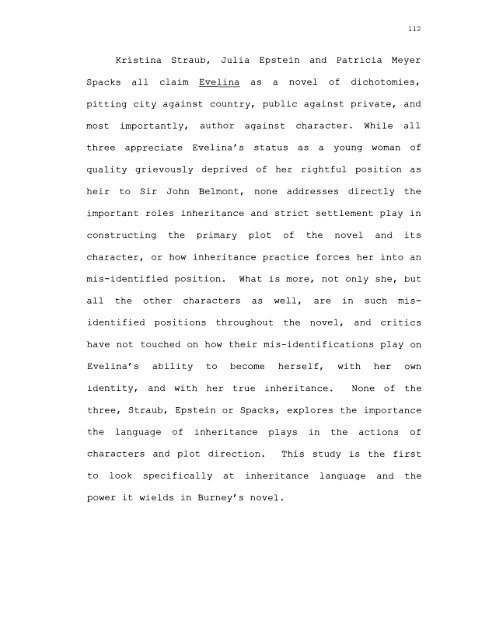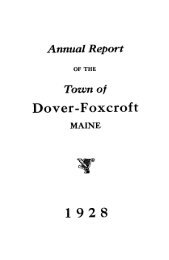- Page 1 and 2:
THE INHERITANCE NOVEL: THE POWER OF
- Page 3 and 4:
Three points are fundamental in ide
- Page 5 and 6:
intelligence. I must also thank Lin
- Page 7 and 8:
Chapter Three ....................
- Page 9 and 10:
"inheritance novels." Three factors
- Page 11 and 12:
specifically to drive the plot. Fir
- Page 13 and 14:
father wished, he could allows equa
- Page 15 and 16:
usually on fiscal matters, but thes
- Page 17 and 18:
(2) . Eileen Spring discusses primo
- Page 19 and 20:
would "resettle" the estate. In oth
- Page 21 and 22:
placed on the estate. Those restric
- Page 23 and 24:
Even the simple definitions of inhe
- Page 25 and 26:
from the surface and often not very
- Page 27 and 28:
mastery and confusion of inheritanc
- Page 29 and 30:
of their futures, while the develop
- Page 31 and 32:
culture, this is the first study to
- Page 33 and 34:
This power which the mind has thus
- Page 35 and 36:
successful marriage was expressed i
- Page 37 and 38:
procedure and could not foresee the
- Page 39 and 40:
the end, is partly responsible for
- Page 41 and 42:
For all the recent criticism dealin
- Page 43 and 44:
welfare. Although several of her br
- Page 45 and 46:
language and a feminine independenc
- Page 47 and 48:
Chapter Two Unhappy Transactions: R
- Page 49 and 50:
Clarissa. Richardson's masterpiece
- Page 51 and 52:
Since Zomchickfs study, Eileen Spri
- Page 53 and 54:
settlement, a predicament Clarissa
- Page 55 and 56:
life and conjectured within the pag
- Page 57 and 58:
included in the compilation of the
- Page 59 and 60:
The eighteenth-century reading publ
- Page 61 and 62:
Clarissa's own will, framing the pl
- Page 63 and 64:
to [the Solmes marriage settlement]
- Page 65 and 66:
Grandfather Harlowe was one of many
- Page 67 and 68: a daughter or daughters, or in the
- Page 69 and 70: name, as a mark of her becoming his
- Page 71 and 72: other and uncles, and keeping her f
- Page 73 and 74: of this, a father often left most o
- Page 75 and 76: deference by every other person, wh
- Page 77 and 78: fits with legal developments outlin
- Page 79 and 80: Harlowe. Mr. Harlowe, Sr., should b
- Page 81 and 82: empowered as such to make all decis
- Page 83 and 84: politics of propertied power well i
- Page 85 and 86: Lovelace is proud, and Richardson r
- Page 87 and 88: een for some time extinct on failur
- Page 89 and 90: have found her less than an angel,
- Page 91 and 92: not yet use physical force, knowing
- Page 93 and 94: elating the story of the Marchiones
- Page 95 and 96: necessity to alter her whole Charac
- Page 97 and 98: you believe it?-And they are all de
- Page 99 and 100: The comic relief Richardson brings
- Page 101 and 102: Clarissa Harlowe found that the Bib
- Page 103 and 104: Conclusion A confluence of settleme
- Page 105 and 106: made her the public care, should en
- Page 107 and 108: had she been "taken off" suddenly,
- Page 109 and 110: Clarissars physical imprisonment in
- Page 111 and 112: to function; and the heroine, Eveli
- Page 113 and 114: the eighteenth century. Virtuous da
- Page 115 and 116: Continent," though Maria's own life
- Page 117: egarding women's places in society.
- Page 121 and 122: she married Charles Burney. The rep
- Page 123 and 124: The language of inheritance is dupl
- Page 125 and 126: accounting of the Evelyn family eve
- Page 127 and 128: Other than his education and a few
- Page 129 and 130: and from the upper classes if he is
- Page 131 and 132: Susan Greenfield points out that Vi
- Page 133 and 134: decision, and then leaves his charg
- Page 135 and 136: a position as the head of his famil
- Page 137 and 138: (Spring 8-38). Caroline Evelyn is a
- Page 139 and 140: always, willing to "obey custom rat
- Page 141 and 142: ecitation and finally believing the
- Page 143 and 144: ignorant of this one young woman, o
- Page 145 and 146: One cannot fathom the Evelyn family
- Page 147 and 148: more powerful than any apprehension
- Page 149 and 150: let alone Evelina. Willoughby and L
- Page 151 and 152: Burney chose a woman and one of amb
- Page 153 and 154: matter her inheritance; only patril
- Page 155 and 156: culture without the help of a fathe
- Page 157 and 158: first encounter with her father. At
- Page 159 and 160: a clandestine marriage with Sir Joh
- Page 161 and 162: time (Straub 2-3). Questions about
- Page 163 and 164: Chapter Four Property Rites: Inheri
- Page 165 and 166: storyline follows the courtship of
- Page 167 and 168: motion. Eileen Spring tells us that
- Page 169 and 170:
Critics place great emphasis on the
- Page 171 and 172:
not favoritism, ultimately decide w
- Page 173 and 174:
driving Austen' s characters and wo
- Page 175 and 176:
Overtones of the pecuniary plight o
- Page 177 and 178:
tendency to believe he could have d
- Page 179 and 180:
dignity, irony, silence. The Bennet
- Page 181 and 182:
family through provision for his ma
- Page 183 and 184:
thousand pounds was enough to make
- Page 185 and 186:
her husband's considerable intellig
- Page 187 and 188:
inability to comprehend inheritance
- Page 189 and 190:
espect" will always betray his lack
- Page 191 and 192:
to heighten his bad qualities and h
- Page 193 and 194:
the symbol of the Bennet dynasty, i
- Page 195 and 196:
"name has become a byword for a sil
- Page 197 and 198:
complimentsf] as unstudied an air a
- Page 199 and 200:
with him from the moment she sees h
- Page 201 and 202:
her, "Upon my word, I say no more h
- Page 203 and 204:
marrying a woman for love. Yet, the
- Page 205 and 206:
practice well enough to know that a
- Page 207 and 208:
Lydia, like her mother, cannot see
- Page 209 and 210:
Had Mr. Bennet removed the entail b
- Page 211 and 212:
to believe. He talks of the late Mr
- Page 213 and 214:
and Mr. Collins could well find the
- Page 215 and 216:
wealth were difficult to determine,
- Page 217 and 218:
the language of effects of strict s
- Page 219 and 220:
ecourse is to escape them. Because
- Page 221 and 222:
of the entail, John Habbakuk is ver
- Page 223 and 224:
power and wealth in a nation," maki
- Page 225 and 226:
Conclusions about Clarissa, Evelina
- Page 227 and 228:
final bequest of Caroline Evelyn as
- Page 229 and 230:
In the same way, Evelina Anville th
- Page 231 and 232:
through her thoughtlessness and sha
- Page 233 and 234:
Bourgh advises everyone on everythi
- Page 235 and 236:
eaching majority, could not continu
- Page 237 and 238:
Brodrick, George W., The Honorable.
- Page 239 and 240:
Greenfield, Susan. " 'Oh Dear Resem
- Page 241 and 242:
----------- . The Richardson-Stinst
- Page 243 and 244:
Trumbach, Randolph. The Rise of the














